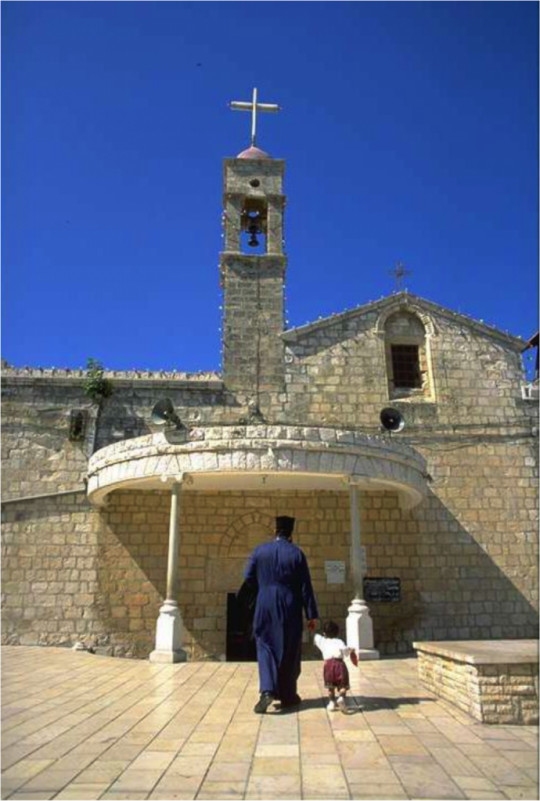Nazareth: Place of Testing
Luke 4:16–30
And he came to Nazareth, where he had been brought up. And as was his custom, he went to the synagogue on the Sabbath day, and he stood up to read. And the scroll of the prophet Isaiah was given to him. He unrolled the scroll and found the place where it was written,
“The Spirit of the Lord is upon me, because he has anointed me to proclaim good news to the poor. He has sent me to proclaim liberty to the captives and recovering of sight to the blind, to set at liberty those who are oppressed, to proclaim the year of the Lord’s favor.”
And he rolled up the scroll and gave it back to the attendant and sat down. And the eyes of all in the synagogue were fixed on him. And he began to say to them, “Today this Scripture has been fulfilled in your hearing.” And all spoke well of him and marveled at the gracious words that were coming from his mouth. And they said, “Is not this Joseph’s son?” And he said to them, “Doubtless you will quote to me this proverb, ‘“Physician, heal yourself.” What we have heard you did at Capernaum, do here in your hometown as well.’”
And he said, “Truly, I say to you, no prophet is acceptable in his hometown. But in truth, I tell you, there were many widows in Israel in the days of Elijah, when the heavens were shut up three years and six months, and a great famine came over all the land, and Elijah was sent to none of them but only to Zarephath, in the land of Sidon, to a woman who was a widow. And there were many lepers in Israel in the time of the prophet Elisha, and none of them was cleansed, but only Naaman the Syrian.”
When they heard these things, all in the synagogue were filled with wrath. And they rose up and drove him out of the town and brought him to the brow of the hill on which their town was built, so that they could throw him down the cliff. But passing through their midst, he went away. (ESV)
In Matthew 4, the Holy Spirit led Jesus into the wilderness to be tempted by Satan after his forty day fast. A monastery—an architectural wonder as you can see—now marks the traditional site of the temptation just north of Jericho.

After defeating temptation in every area—the lust of the eyes, the lust of the flesh, and the pride of life—on our behalf, Jesus returned to his hometown of Nazareth.
There are two churches claiming to be the site of Gabriel’s announcement to Mary that she would bear the Messiah (Lk. 1:28). This Greek Orthodox church is the one I have visited—some say it is a more likely location than the Roman Catholic one.
In his gospel, Matthew skipped over Jesus’ ministry in Nazareth and goes on to the events in Galilee. But Luke, who had a special interest in the stories of the downtrodden, did not (Lk. 4:14-30). Luke says that Jesus’ early foray into ministry was highly popular and “successful,” as we might say, because “everyone praised him” for his teaching in the synagogues.
That is, until he challenged their bigotry. It was not Jesus’ claim to be the Messiah that turned the crowds against him; it was his declaration that the gospel was for Gentiles, too. Jesus reminded that Elijah helped a Gentile widow in Sidon (something Jesus would later do as well) and that Elisha healed a Syrian. Furthermore, he implied that if the Israelites remained proud and unrepentant, God’s salvation would be withheld from them and extended further to the Gentiles (Lk. 4:24-27).
Without denying that he was the Messiah, they took him to the “brow of the hill on which the town was built in order to throw him down the cliff” (Lk. 4:29). They did not want a Messiah who would force them to admit that they were as needy and as undeserving as those they looked down upon or denied grace.

To stand on the Mt. of Precipice was a sobering stop on my pilgrimage. I had to ask myself if I was willing to follow Jesus in every way. I enjoy it when people praise me, but I am not always willing to stand up to those who identify themselves as believers but think others are unworthy of mercy, especially if it means being thrown away.
Jesus has hard words for the person who excludes another because they are not part of the same popular crowd or because their cultural lineage is believed to be inferior. He has hard words for the person who feels superior to another because of their level of education. He has hard words for the person who distances themselves from another or refuses to trust them because of their skin color. And he has hard words for the person who judges the worship of another or avoids fellowship with them because their theology is not as “correct” as one’s own.
Jesus passed through the crowd and would not allow them to throw him over because it was not his time to die. His sovereignty over the gospel’s distribution as well as over dangerous situations should make us bold as well as humble.
